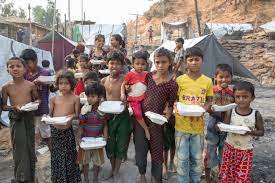The head of the Nobel Prize-winning U.N. World Food Program warned Friday that without additional billions of dollars to feed millions of hungry people, the globe could experience mass migration, unstable nations, and malnourished children and adults over the next 12 to 18 months.
Last year, David Beasley applauded increasing support from the US and Germany and asked China, the Gulf countries, billionaires, and other governments to “step up big time.”
The former governor of South Carolina stated that he is “extremely worried” that the World Food Program (WFP) won’t be able to raise the $23 billion it needs this year to assist millions of people in need in an interview before handing the reins of the world’s largest humanitarian organization to American ambassador Cindy McCain the following week.
Very bluntly, he remarked, “At this point, I’ll be amazed if we get 40% of it.
Beasley generated $14.2 billion for the World Food Program last year, more than doubling the $6 billion he did in 2017, the year he took on the executive director role. More than 128 million individuals in more than 120 countries and territories benefited from this funding.
Beasley claimed he was successful in persuading the US to increase financing last year from roughly $3.5 billion to $7.4 billion and Germany to increase money from $350 million a few years ago to $1.7 billion, but he doesn’t believe they’ll do it again this year.
He argued that other nations must now step up, beginning with China, the second-largest economy in the world, which provided the World Food Program only $11 million in 2017.
Beasley praised China for its success in significantly decreasing domestic hunger and poverty but noted that it contributed less than one cent per person in comparison to the United States, the world’s largest economy, which contributed roughly $22 per person last year.
He stated that China must “engage in the multilateral world” and be prepared to offer crucial assistance. “They owe it to themselves morally to do so.”
Beasley claimed that they had done “a fantastic job of feeding their people” and that “now we need their help in other areas of the world” to learn from their methods, particularly in poorer nations like Africa.
With rising oil prices, Gulf countries can also contribute more, particularly Muslim states that have ties to nations in east Africa, the Sahara, and other parts of the Middle East, he said, hoping they will do so.
Even if the charity isn’t a long-term answer to the food crisis, Beasley claimed that the richest billionaires generated unheard-of profits during the COVID-19 pandemic and that “it’s not too much to expect some of the multibillionaires to stand up and help us in the short-term issue.”
He stated that in the long run, he would genuinely like to see billionaires use their experience and success to support “the world’s largest need and that is food on the globe to feed 8 billion people.”
“The world must realize that the next 12 to 18 months are crucial, and if we back off the money, you will have mass migration, you will have destabilized governments, and it will all be on top of the child and human starvation throughout the world,” he said.
Beasley claimed that WFP had to reduce rations for 4 million Afghans by 50%, and that “these are folks who are banging on famine’s door now.”
“We don’t have enough money right now,” he continued, “simply to reach the most vulnerable people.” Hence, if we don’t act quickly, we could truly have hell on Earth. We are currently at the cliff stage.
Beasley claimed that he has been warning Western and European leaders that, despite their attention being primarily focused on Ukraine and Russia, they “better will not forget about what’s south and southeast of you because I can assure you it is coming your way if you don’t pay attention and get on top of it.”
There is no excuse for any child to die of malnutrition, he claimed, given the $400 trillion in riches that exist on the earth.
According to the WFP executive director, decision-makers must give priority to the humanitarian needs that will have the biggest influence on global societal stability.
The Sahel region of Africa, as well as the east, which includes Somalia, northern Kenya, South Sudan, and Ethiopia, as well as Syria, which is having an effect on Jordan and Lebanon, as well as Central and South America, where the number of people migrating to the United States is now five times higher than it was a year and a half ago, were singled out as priority areas.
McCain, the wife of Arizona-based U.S. Senator John McCain, who was the 2008 Republican presidential nominee and served as the country’s ambassador to the U.N. Food and Agriculture Organization and the WFP in Rome, according to Beasley, “is the right person at the right time” to be in charge of the World Food Program.
He said that they have been collaborating to ensure that “she hits the ground running,” but added that “it’s going to be a very, very hard period” due to the amount of money going toward the Ukrainian conflict and the requirement to support other vulnerable economies.
Beasley claimed that his biggest surprise was thinking that “we could end world hunger and put the World Food Program out of business” in April 2017, when he took over the organization and 80 million people were “marching to starvation” around the globe.
He claimed that he had not anticipated the conflicts and wars, the climate shocks, the COVID-19 pandemic, and the Ukraine war, which had increased the 80 million people in need of food to 135 million just before COVID began to spread in early 2020, 276 million before Russia invaded Ukraine, “the bread basket of the world,” in February 2022, and 350 million at the present time.
It’s challenging to avoid feeling down, but two things offer Beasley hope.
The bipartisan support in the frequently polarized U.S. Congress for aiding the world’s poorest people “inspires you not to give up,” he said, just as seeing happy little girls and boys while they are going through war and going hungry does.
Beasley stated that his ambition to solve world hunger still stands as he heads back to his family in South Carolina.


















